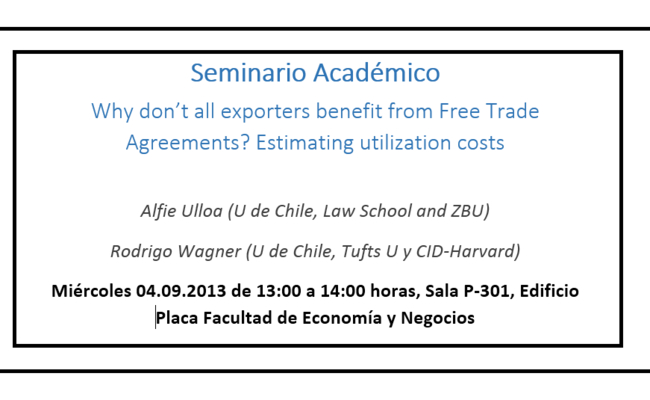Seminario Académico: Why don’t all Exporters Benefit from Free Trade Agreements? Estimating Utilization Costs
Fecha de inicio: 04 de Septiembre de 2013, 13:00 hrs.
Fecha de término: 04 de Septiembre de 2013, 14:00 hrs.
Seminario académico donde presentarán los economistas Alfie Ulloa y Rodrigo Wagner. A realizarse el día miércoles 04.09 de 13:00 a 14:00 horas en la sala P-301 del Edificio Placa, FEN.
Seminario Académico
Título: “Why don’t all Exporters Benefit from Free Trade Agreements? Estimating Utilization Costs”
Autor (es): Alfie Ulloa (U. de Chile, Law School and ZBU) y Rodrigo Wagner (U. de Chile, Tufts U and CID-Harvard)
Presenta: Rodrigo Wagner (U. de Chile, Tufts U and CID-Harvard)
ABSTRACT
Free Trade Agreements (FTA) attract significant interest, but after these treaties are signed not all exporters use them. We provide a model of heterogeneous utilization, also developing a novel method to estimate treaty-utilization costs. We later apply the model to estimate the evolution utilization costs for the FTA between the US and a small open economy, Chile. Consistent with other studies, we find that utilization is indeed partial (on average 67% on the first year of the treaty, with 10 percentage points more at the third year). This made tariff revenues to the US 10% higher than expected with full utilization. Our simple structural model identifies costs by exploiting the indifference condition for the smallest firm that uses the treaty. Empirically we find that estimated costs were very heterogeneous across products. For almost half the products the cost was not binding for any exporter. However, when the FTA started, the 75-th percentile of utilization cost was around US$3,000, requiring shipments above $80,000 to justify using the treaty. These costs decreased by 60-80% in the following years, consistent with models of learning about treaty use. As remarked in our model, small exporters that do not use the trade agreement could even suffer when large firms have the option of using the treaty, since the latter increase exports and may push up factor prices for the industry.
JEL classification: F1
Key words: Heterogeneous effects of trade agreements, Small and Medium Enterprises (SME), Policy implementation.
